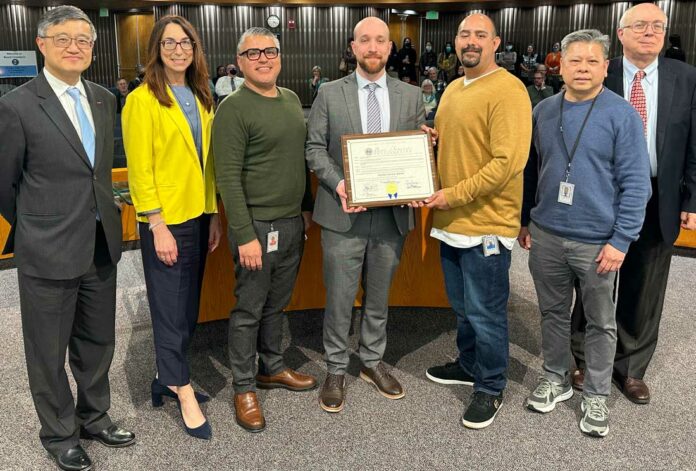
Public safety and providing opportunities for individuals leaving jail or prison can be perceived as opposing objectives. But the County of Santa Clara is building relationships between law enforcement and reentry services to create environments where residents involved with the justice system can heal and become self-sufficient, contributing members of society. And that benefits us all.
Over the last 12 years, the County’s Reentry Network—a group of county and community stakeholders, including law enforcement agencies—has been guiding development of the county’s reentry efforts. Creating a system to help individuals successfully reunite with their communities requires holding them accountable for their actions, while also acknowledging their challenges, strengths and potential.
Recognizing the importance of allowing people to move on from their mistakes once they have served their sentences, the County of Santa Clara Board of Supervisors joined the White House, states and communities nationwide in proclaiming April 2023 Second Chance Month. If we truly want to address recidivism, we must allow the 80 million Americans with an arrest or conviction record the chance to house and feed themselves and their families, and to participate in their communities.
This year marks the fifth anniversary of the County’s South County Reentry Resource Center. Along with the Reentry Resource Center in San José, it assists newly released individuals in obtaining healthcare, general assistance, food, substance use services, shelter and referrals for employment, education, faith-based and legal services, and more.
But all of those resources fall flat without a community willing to reengage with people trying to improve their lives. Social stigmas are challenging for individuals leaving custody, according to Mark, a former Reentry client.
“There’s a big difference between attempted murder and being caught for drug possession,” he said. But often employers, landlords and community members don’t take the time to learn about an individual’s background and make those differentiations. That contributes to the fact that 75% of people who have been incarcerated remain unemployed one year after release.
Mark was connected to Julian Delgadillo, a Reentry Specialist for The Good Samaritan Reentry Center in San José, who provides client case management services at the South County Reentry Resource Center.
“Programs like this are absolutely necessary,” Mark said. “Especially for those who have lost touch with their families. You need someone you can relate to and who can guide you.”
Charles, another former client, left prison feeling lost and out of touch with how to cope in the world after 25 years of incarceration. Delgadillo coordinated help with his utility bills, car registration, food and a job that accommodated Charles’ physical disability. Now he is a driver for a local business and enjoys life with his wife in rural Gilroy.
“I can’t say enough about him,” Charles said. “He checked in on me every week to make sure I was OK.”
Success stories of former clients abound. They are business owners, tradespeople, counselors and public servants. Many attribute their turning point to an employer who offered them a job, a case worker who pushed them to apply for college, or a community member who invited them to join an organization. We can all offer someone a second chance.
“When you give people a little bit of hope, it turns the lights on and opens up doors,” Mark said. “They realize that having a life again is possible.”
Javier Aguirre is the Santa Clara County Office of Reentry Services Director. Pedro Espinoza is the Chief of Police for the City of Gilroy. Shane Palsgrove is the Chief of Police for the City of Morgan Hill.







